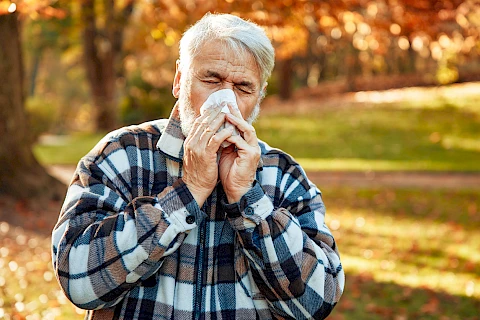
Fall can be a tough time for seniors who suffer from seasonal allergies. As the leaves change and the weather cools down, allergens like ragweed and mold can make life uncomfortable. Managing allergies is especially important for seniors, as it can significantly affect their overall health and well-being.
Understanding Seasonal Allergies
Common fall allergens include ragweed, mold, and dust mites. Ragweed pollen is particularly prevalent and can travel for miles in the wind. Mold spores increase as leaves fall and decay and dust mites can thrive in cozy indoor environments.
Symptoms of seasonal allergies in seniors often include sneezing, a runny or stuffy nose, and itchy eyes. Sometimes, these symptoms can be mistaken for a common cold, but unlike a cold, allergies won't usually cause a fever. For seniors, allergies can also exacerbate other health issues like asthma or chronic respiratory problems, making it even more important to manage them effectively.
Identifying Allergy Symptoms
It's crucial to differentiate between allergies and common colds. Allergies tend to last longer and recur annually around the same time, whereas colds usually run their course in about a week. A symptom diary can help track when and how long they last.
If a senior experiences severe symptoms that persist for more than a couple of weeks, it's important to seek medical advice. This is especially true if allergy symptoms worsen health conditions like asthma or bronchitis.
Creating an Allergen-Free Home Environment
It is essential to keep the home environment as allergen-free as possible. Regular cleaning and dusting can go a long way in reducing allergens. Vacuum carpets and upholstery frequently, and consider using a vacuum with a HEPA filter.
Air purifiers can also be beneficial in removing airborne allergens. Dehumidifiers help control mold by reducing moisture in the air. Be mindful of indoor plants, as they can harbor mold. If you have pets, bathe them regularly to reduce dander. Good ventilation is crucial—open windows to air out the home, but be mindful of high pollen days.
Working with Healthcare Providers
Consulting with healthcare providers is a key part of managing seasonal allergies. Doctors and allergists can provide specific advice tailored to individual needs. Various medications and treatments, such as antihistamines, nasal sprays, and allergy shots, are available for seniors.
Regular check-ups and follow-ups are important. They help monitor the effectiveness of a treatment plan and allow adjustments to be made as needed. Seniors should always consult their healthcare provider before starting new medications.
Practical Tips for Daily Management
Here are some practical tips for managing seasonal allergies daily:
- Stay indoors during high pollen times, typically in the early morning
- Wear masks and sunglasses when going outside to protect yourself from airborne pollen
- Shower and change clothes after outdoor activities to remove pollen
- Stay hydrated and maintain a healthy diet to support immune health
- Use air conditioning in the car and home to filter out allergens
- Keep windows closed during high pollen days
- Avoid hanging laundry outside where it can collect pollen
- Use a nasal rinse to clear allergens from nasal passages
These strategies can make it much easier to manage everyday symptoms of allergies.
More Support for Seniors
From understanding the common allergens and identifying symptoms to creating an allergen-free home, working closely with healthcare providers, and following practical tips for daily management, there are several things caregivers can do to make life more comfortable for seniors dealing with serious allergy symptoms. Do you have a loved one who needs more assistance at home, including help managing the causes and symptoms of seasonal allergies?
Contact Senior Helpers Santa Monica for personalized support in Santa Monica, Los Angeles, Pacific Palisades, and Marina del Rey. We're here to help seniors live healthier, happier lives.